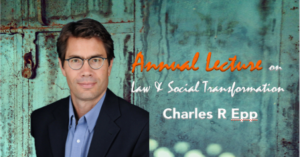– Understanding Strategic Litigation Campaigns
Norwegian climate change activists consider going to court to force policy change on oil drilling. In the United States there is an ongoing campaign by environmental groups to mitigate greenhouse gas emissions where litigation has played a central part – in some cases with considerable success. What factors influence how litigation campaigns are planned and carried out? How do their organizers decide what legal claims to make, when and where? How do these decisions interact with grassroots movements and official decisions to shape the path of legal change over time? Using experiences from climate change litigation in the US, this lecture sketches the outlines of a theory to better understand the course of litigation campaigns in light of the pull of grassroots mobilization, opportunities associated with state policy and official action, and exigencies related to funding and organizational capacity.
Charles Epp is the author of one of the most cited books in law & society scholarship:
The Rights Revolution: Lawyers, Activists, and Supreme Courts in Comparative Perspective and highly acclaimed books on Making Rights Real: Activists, Bureaucrats, and the Creation of the Legalistic State and Pulled Over: How Police Stops Define Race and Citizenship.
The lecture is followed by a debate with Catalina Vallejo; Bruce Wilson, Adrian Jjuuko and Crispine Sibande, Chaired by Siri Gloppen
See event on Facebook here!
Charles R. Epp is University Distinguished Professor at the School of Public Affairs and Administration, University of Kansas. His research focuses on law, social change and administrative reform, with a particular emphasis on rights, racial discrimination, and strategic litigation for social change. His research, supported by multiple grants from the National Science Foundation, has resulted in many journal articles and several books published by the University of Chicago Press: The Rights Revolution: Lawyers, Activists, and Supreme Courts in Comparative Perspective, one of the most cited books in law & society scholarship which won the C. Herman Pritchett Award and the Lasting Contribution Award of the Law and Courts Section of the American Political Science Association, Making Rights Real: Activists, Bureaucrats, and the Creation of the Legalistic State, which was named an Outstanding Academic Title by the American Library Association, and Pulled Over: How Police Stops Define Race and Citizenship, co-authored with colleagues Steven Maynard-Moody and Donald Haider-Markel, which won the Best Book Award from the American Society for Public Administration’s Section on Public Administration Research and the Choice outstanding academic title award. He is currently engaged in two major studies, one on the growing role of the police in the American state and the other on strategic litigation to address greenhouse gas emissions.

